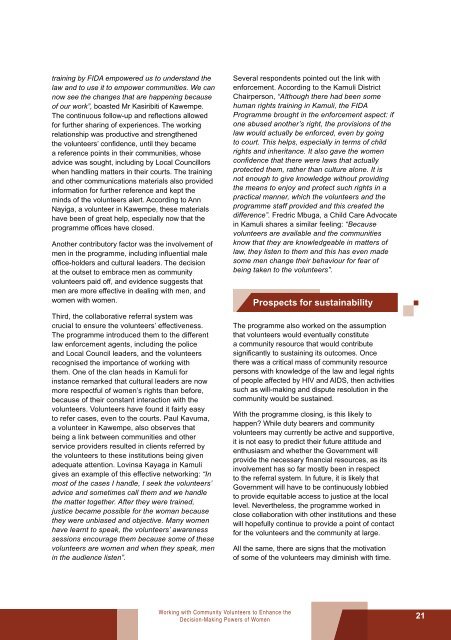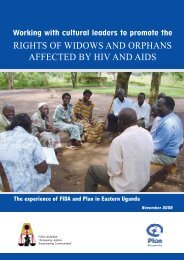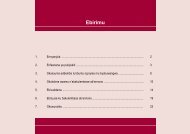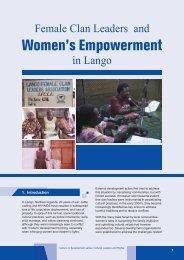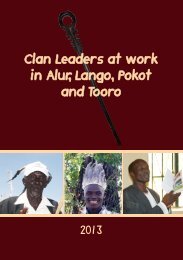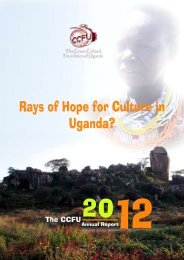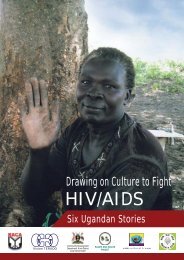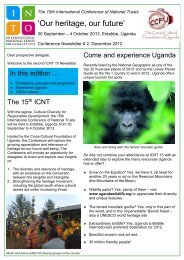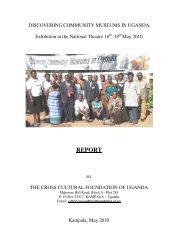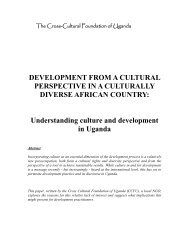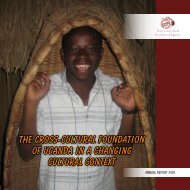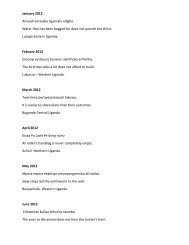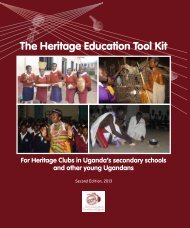Working With Community Volunteers to enhance the decision ...
Working With Community Volunteers to enhance the decision ...
Working With Community Volunteers to enhance the decision ...
You also want an ePaper? Increase the reach of your titles
YUMPU automatically turns print PDFs into web optimized ePapers that Google loves.
training by FIDA empowered us <strong>to</strong> understand <strong>the</strong>law and <strong>to</strong> use it <strong>to</strong> empower communities. We cannow see <strong>the</strong> changes that are happening becauseof our work”, boasted Mr Kasiribiti of Kawempe.The continuous follow-up and refl ections allowedfor fur<strong>the</strong>r sharing of experiences. The workingrelationship was productive and streng<strong>the</strong>ned<strong>the</strong> volunteers’ confi dence, until <strong>the</strong>y becamea reference points in <strong>the</strong>ir communities, whoseadvice was sought, including by Local Councillorswhen handling matters in <strong>the</strong>ir courts. The trainingand o<strong>the</strong>r communications materials also providedinformation for fur<strong>the</strong>r reference and kept <strong>the</strong>minds of <strong>the</strong> volunteers alert. According <strong>to</strong> AnnNayiga, a volunteer in Kawempe, <strong>the</strong>se materialshave been of great help, especially now that <strong>the</strong>programme offi ces have closed.Ano<strong>the</strong>r contribu<strong>to</strong>ry fac<strong>to</strong>r was <strong>the</strong> involvement ofmen in <strong>the</strong> programme, including infl uential maleoffi ce-holders and cultural leaders. The <strong>decision</strong>at <strong>the</strong> outset <strong>to</strong> embrace men as communityvolunteers paid off, and evidence suggests thatmen are more effective in dealing with men, andwomen with women.Third, <strong>the</strong> collaborative referral system wascrucial <strong>to</strong> ensure <strong>the</strong> volunteers’ effectiveness.The programme introduced <strong>the</strong>m <strong>to</strong> <strong>the</strong> differentlaw enforcement agents, including <strong>the</strong> policeand Local Council leaders, and <strong>the</strong> volunteersrecognised <strong>the</strong> importance of working with<strong>the</strong>m. One of <strong>the</strong> clan heads in Kamuli forinstance remarked that cultural leaders are nowmore respectful of women’s rights than before,because of <strong>the</strong>ir constant interaction with <strong>the</strong>volunteers. <strong>Volunteers</strong> have found it fairly easy<strong>to</strong> refer cases, even <strong>to</strong> <strong>the</strong> courts. Paul Kavuma,a volunteer in Kawempe, also observes thatbeing a link between communities and o<strong>the</strong>rservice providers resulted in clients referred by<strong>the</strong> volunteers <strong>to</strong> <strong>the</strong>se institutions being givenadequate attention. Lovinsa Kayaga in Kamuligives an example of this effective networking: “Inmost of <strong>the</strong> cases I handle, I seek <strong>the</strong> volunteers’advice and sometimes call <strong>the</strong>m and we handle<strong>the</strong> matter <strong>to</strong>ge<strong>the</strong>r. After <strong>the</strong>y were trained,justice became possible for <strong>the</strong> woman because<strong>the</strong>y were unbiased and objective. Many womenhave learnt <strong>to</strong> speak, <strong>the</strong> volunteers’ awarenesssessions encourage <strong>the</strong>m because some of <strong>the</strong>sevolunteers are women and when <strong>the</strong>y speak, menin <strong>the</strong> audience listen”.Several respondents pointed out <strong>the</strong> link wi<strong>the</strong>nforcement. According <strong>to</strong> <strong>the</strong> Kamuli DistrictChairperson, “Although <strong>the</strong>re had been somehuman rights training in Kamuli, <strong>the</strong> FIDAProgramme brought in <strong>the</strong> enforcement aspect: ifone abused ano<strong>the</strong>r’s right, <strong>the</strong> provisions of <strong>the</strong>law would actually be enforced, even by going<strong>to</strong> court. This helps, especially in terms of childrights and inheritance. It also gave <strong>the</strong> womenconfi dence that <strong>the</strong>re were laws that actuallyprotected <strong>the</strong>m, ra<strong>the</strong>r than culture alone. It isnot enough <strong>to</strong> give knowledge without providing<strong>the</strong> means <strong>to</strong> enjoy and protect such rights in apractical manner, which <strong>the</strong> volunteers and <strong>the</strong>programme staff provided and this created <strong>the</strong>difference”. Fredric Mbuga, a Child Care Advocatein Kamuli shares a similar feeling: “Becausevolunteers are available and <strong>the</strong> communitiesknow that <strong>the</strong>y are knowledgeable in matters oflaw, <strong>the</strong>y listen <strong>to</strong> <strong>the</strong>m and this has even madesome men change <strong>the</strong>ir behaviour for fear ofbeing taken <strong>to</strong> <strong>the</strong> volunteers”.Prospects for sustainabilityThe programme also worked on <strong>the</strong> assumptionthat volunteers would eventually constitutea community resource that would contributesignifi cantly <strong>to</strong> sustaining its outcomes. Once<strong>the</strong>re was a critical mass of community resourcepersons with knowledge of <strong>the</strong> law and legal rightsof people affected by HIV and AIDS, <strong>the</strong>n activitiessuch as will-making and dispute resolution in <strong>the</strong>community would be sustained.<strong>With</strong> <strong>the</strong> programme closing, is this likely <strong>to</strong>happen? While duty bearers and communityvolunteers may currently be active and supportive,it is not easy <strong>to</strong> predict <strong>the</strong>ir future attitude andenthusiasm and whe<strong>the</strong>r <strong>the</strong> Government willprovide <strong>the</strong> necessary fi nancial resources, as itsinvolvement has so far mostly been in respect<strong>to</strong> <strong>the</strong> referral system. In future, it is likely thatGovernment will have <strong>to</strong> be continuously lobbied<strong>to</strong> provide equitable access <strong>to</strong> justice at <strong>the</strong> locallevel. Never<strong>the</strong>less, <strong>the</strong> programme worked inclose collaboration with o<strong>the</strong>r institutions and <strong>the</strong>sewill hopefully continue <strong>to</strong> provide a point of contactfor <strong>the</strong> volunteers and <strong>the</strong> community at large.All <strong>the</strong> same, <strong>the</strong>re are signs that <strong>the</strong> motivationof some of <strong>the</strong> volunteers may diminish with time.<strong>Working</strong> with <strong>Community</strong> <strong>Volunteers</strong> <strong>to</strong> Enhance <strong>the</strong>Decision-Making Powers of Women21


